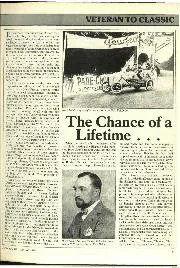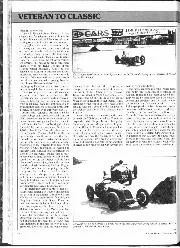

The Chance of a Lifetime...
It must have been the dream of more than one schoolboy, surely, that a racing-car would come into the pits and, no driver being available to relieve the man who…
FLEXIBILITY OF HIGH-COMPRESSION ENGINES.
By Professor A. M. Low.
ENGINE flexibility is an important subject and the small motor-cars of to-day have occasional buzzing in the engine. Most of this trouble is entirely due to the fact that high compression engines are not flexible in the true sense of the word. A high compression engine usually means a rapid explosion, and it is obvious that a high rate of flame propagation implies a high piston speed, but power at high. engine speeds does not necessarily include the ability to accelerate on top gear, so important for comfortable driving. The problem of economy with a mixture suitable to the ordinary engine has been recently dealt with in a novel manner by a new system of carburation in which the petrol is beaten against a small shroud surrounding a jet of more or less natural appearance. in this instrument, known as the R.A.G. Autometer, the petrol is not heated in any way before passing through a jet, but has its direction of flow rapidly changed by the shroud directly after leaving the jet orifice. After breaking up of the liquid has occurred, the resultant mixture which contains petrol not necessarily in a vapourised form but in a condition of extremely fine division, is passed without heating to a venturi choke where local pressure is low. As vaporisation takes place tire mixture is passed up a streamline choke to the engine in the ordinary manner A photographic examination of the petrol particles has shown them to be smaller and more distorted than those issuing from the ordinary carburettor, even if the examination is conducted at a distance of over 5 centimetres from the orifice. The shape of the particles is not globular, and they are therefore in such a condition that the surface presented to the incoming air is far greater than under ordinary conditions of petrol flow. As a natural corollary to this method of preparing the liquid fuel, it is possible to mix the strong mixture of petrol particles and the air which proceed from the well of the carburettor with any portion of air which is necessary to give the correct explosion speed for any definite r.p.m. of the engine. It is, therefore, possible to obtain a definite response from any particular throttle opening, and to prevent knocking due to high flame rate on ordinary fuels. Leakages on rough engines can be corrected without loss of volumetric efficiency. A high rate of acceleration can also be obtained on a gear which is necessarily unusually correct because the explosion motor cannot always be operated
at the correct r.p.m. for every condition of high, speed, wind or loading.